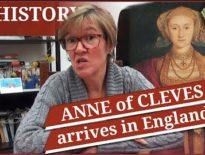Today, 28th December, is Childermas or Holy Innocents' Day, which was an important part of the Twelve Days of Christmas in Tudor times.
In today's talk, I explain the origin of this feast day and how it was commemorated in the Tudor period.
Also on this day in history:
- 1510 – Birth of Sir Nicholas Bacon, lawyer, administrator and Lord Keeper of the Great Seal in Elizabeth I's reign. He was the second son of Robert Bacon, yeoman and sheep-reeve (chief shepherd), and his wife Isabel Cage, and he was the father of the famous philosopher, statesman, scientist and author, Sir Francis Bacon.
- 1572 – Death of John Hales, member of Parliament, writer and administrator. He was buried in St Peter-le-Poer Church, Broad Street, London. Hales served as Clerk of the Hanaper, a Justice of the Peace and member of Parliament.
- 1582 – Burial of goldsmith John Mabb at St Matthew Church, Friday Street, off Cheapside in London. Mabb was also Chamberlain of the City of London.
- 1603 – Death of John Joscelin (Joscelyn), clergyman, antiquary and Old English scholar, at High Roding. He was buried at All Saints' Church, High Roding. Joscelin was Latin secretary to Matthew Parker, Archbishop of Canterbury, and is known for his Old English-Latin dictionary and the work he did for Parker in discovering and publishing lost manuscripts.
Transcript:
Today is Childermas (Children’s Mass) or Holy Innocents’ Day, which was part of the Twelve Days of Christmas celebrated in the Tudor period.
I’m going to share with you an excerpt from the Tudor Society ebook Christmas in Tudor times to explain this feast day...
This feast day commemorates the massacre of the baby boys which King Herod ordered in Bethlehem, in an attempt to kill the infant Jesus Christ. The innocent babies were seen by the Catholic Church as the very first martyrs.
The 16th century Christmas carol, The Coventry Carol, which was sung on 28th December, referred to the massacre:
“Herod the King, in his raging,
Charged he hath this day;
His men of might, in his own sight,
All children young, to slay.”
The story is told in Matthew Chapter 2 and here it is from William Tyndale’s New Testament:
“When Jesus was born at Bethlehem in Jury, in the time of Herod the king. Behold, there came wise men from the east to Jerusalem saying: Where is he that is born King of the Jews? We have seen his star in the east, and are come to worship him. When Herod the king, had heard this, he was troubled, and all Jerusalem with him, and he gathered all the chief priests and scribes of the people, and asked of them where Christ should be born. And they said unto him: at Bethlehem in Jury. For thus it is written by the prophet:
And thou Bethlehem in the land of Jury, art not the least as concerning the princes of Juda. For out of thee shall come the captain that shall govern my people Israhel.
Then Herod privily called the wise men, and diligently enquired of them, the time of the star that appeared. And sent them to Bethlehem saying: Go and search diligently for the child. And when ye have found him bring me word, that I may come and worship him also. When they had heard the king, they departed, and lo the star which they saw in the east went before them, until it came and stood over the place where the child was. When they saw the star, they were marvellously glad. And went into the house, and found the child with Mary his mother, and kneeled down and worshipped him, and opened their treasures, and offered unto him gifts, gold, frankincense, and myrrh. And after they were warned of God in a dream that they should not go again to Herod, they returned into their own country another way.
When they were departed, behold the angel of the Lord appeared to Joseph in dream saying: arise and take the child and his mother, and fly into Egypt, and abide there till I bring thee word. For Herod will seek the child to destroy him.
Then he arose, and took the child and his mother by night, and departed into Egypt, and was there unto the death of Herod, to fulfil that which was spoken of the Lord, by the prophet, which saith: out of Egypt have I called my son.
Then Herod perceiving that he was mocked of the wise men, was exceeding wroth, and sent forth and slew all the children that were in Bethlehem, and in all the coasts thereof, as many as were two year old and under, according to the time which he had diligently searched out of the wise men. Then was fulfilled, that which was spoken by the prophet Jeremy, saying:
On the hills was a voice heard, mourning, weeping, and great lamentation. Rachel weeping for her children, and would not be comforted, because they were not.”
As Matthew says, Herod failed to kill Jesus, but many infants were killed and they are known as the Holy Innocents.
In “A Tudor Christmas”, Alison Weir and Siobhan Clarke write that in Tudor times, adults fasted on this day and sometimes children were whipped as they lay in their bed first thing in the morning, as a reminder of the suffering of those massacred infants. After that, though, they were given free rein to enjoy themselves for the rest of the day. Another custom associated with the day in the medieval period, was, according to Wikipedia, “refraining where possible from work on the day of the week on which the feast of Innocents Day had fallen for the whole of the following year until the next Innocents Day.” I do like that idea.
In Spain, where I live, Childermas is a bit like April Fools’ Day, and pranks, or bromas, are played on people. One Spanish website gave ideas for bromas which included substituting salt for sugar, changing the time on the clock while the victim is sleeping, sticking a coin to the road or pavement so people can’t pick it up, putting toothpaste on a person’s face while they sleep, scaring them by hiding behind a door and jumping out at them, any of the tricks that you’d use on April Fools really. We had no idea about this tradition in Spain until our local barman played a trick on us with our drinks one 28th December.
Feel free to play pranks on your friends and family today and just explain that you’re marking Holy Innocents’ Day.



Leave a Reply